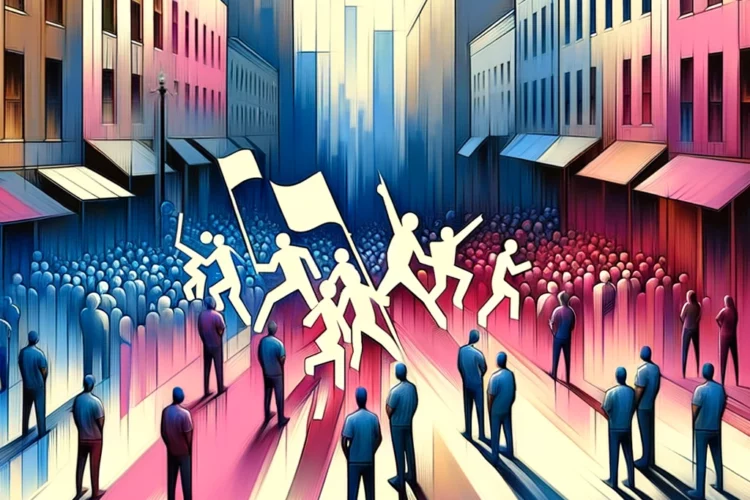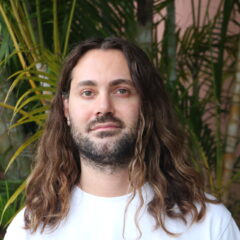Anti-gender movements have been emerging in all parts of the world, posing a severe threat to democracy and human rights. But how can their growing support be explained? And what can be done to counteract it from an international human rights perspective?
Far-right (1) support is the symptom of underlying antisocial neoliberal (2) economic and political policies. Individuals are not born radical far-right supporters; they are formed during their lifetimes. Understanding what factors account for increased radicalization is necessary to address the issue and avoid the risks of violence and loss of democracy.
Theories explaining the support for radical groups (3) fall either under the supply-side or the demand-side categories (Rydgren, 2007). Supply-side theories look at electoral settings, party systems, their messages, and strategies. “The ‘demand side,’ on the other hand, encompasses traits, experiences, and attitudes that may predispose voters to support an RRP(radical right parties)” (2007, p. 217). Scholars have been pointing out that this division is arbitrary, and both sides are required for the far-right to be successful – conceptually far-right groups tap into the existing social problems (demand-side factors) (Rydgren, 2018).
This article focuses on the demand-side factors, particularly the Modernization Losers thesis, which “argues that the rise of new radical right-wing parties can be understood as “the radical effort to undo” social change associated with modernization, that is, “a growing autonomy of the individual (status mobility and role flexibility) and ongoing functional differentiation of the society (segmentation and growing autonomy of societal subsystems).” (ibid, p. 247).
In these sociological theories on the factors contributing to radicalization, the neoliberal economic system emerges as the critical element. We live in a world where neoliberalism has become the global economic model entrenched in all aspects of social life. International human rights paradigms, which predominantly center on civil and political rights while sidelining economic and social rights (i.e., just economic redistribution and equal access to resources), contribute to the division of humans, reinforce the view that we are all egoistic agents, disregard economic redistribution as one of the preconditions for enjoying rights and therefore legitimize the neoliberal economic system.
The premise of the individual rights doctrine is that every human individual is born free. Freedom is expressed in the form of free will. The aim of the rights is the protection of freedom from the State or other forms of violence and coercion. Individual rights theory is based on the premise that protecting the innate freedom of individuals will ultimately lead to human flourishing. Individualism sees equality as equal protection of this freedom, i.e., equality before the law. The system can be just if it enables every individual to freely express their will and to act according to their will without violence or coercion. A position, that a person then achieves in a social hierarchy, is a result of a rational decision made by the person freely, and therefore it is just. Individual human rights come from Western political thought.
The concept of collective rights, on the other hand, is mainly rooted in non-western colonized peoples’ struggles for sovereignty and their advocacy efforts for the inclusion of such a right in the UN system (Barreto, 2013). Moreover, the idea of collectives also comes from Marxist political thought, which is heavily interested in class struggles. It sees the possibility of achieving a just society by collective ownership of property and participation in society (Boyd, 2009).
Collective rights are rights attributed to groups of people. The groups are seen as individuals having a sense of belonging to a community based on shared identities. These identities might be their ethnic origin, language, culture, social class, etc. One example of collective rights is the right to self-determination, enshrined in the United Nations Charter. The language of the article suggests that ‘peoples’ have the right to self-determination. The first articles of the Covenants on Civil and Political Rights, as well as Social, Cultural, and Economic Rights, also mention “peoples” right to self-determination. UN’s Declaration of the Rights of Indigenous Peoples is another example of collective human rights.
Individualism is based on a false presumption of free will. Free will was invented by Christian theology to justify why God punishes individuals (Harari, 2018). Our every choice depends on many biological, economic, social, cultural, and other factors, which we did not choose, but which eventually determine our choices. Moreover, poststructuralist thinkers have explained how our subjectivity is formed and is the effect of the culture, rather than a biological given.
On the other hand, completely disregarding individualism can easily lead to an authoritarian system where individuals’ interests and rights can be disregarded for the interest of collectives. Also, collectives tend to have inner hierarchies (Felmeth, 2016). Discrimination against LGBTQI communities and women can serve as an example: culture has been used to justify the exclusion of queer people and women in almost every culture.
Individualism has brought the notion of the importance of the individual and the idea that one’s rights cannot be sacrificed for the collective’s interests. Nevertheless, collectivism can give the groups more bargaining power and serve as a tool for more equal redistribution of welfare. Individual rights are impossible without collective action. Labor unions have been an essential representation of collective power to gain economic advancements, without which civil and political rights will probably not make sense. For example, what worth does the right to vote, or freedom of movement have, if you starve to death?
International human rights institutions and activism predominantly center on civil and political rights, and economic and social rights are frequently understood as individual responsibilities. Therefore, human rights development and democratization can be experienced by many in terms of minority groups’ situation improving while most of the population’s conditions deteriorating (due to increasing economic inequality).
From the activist perspective, this means approaching advocacy by centering on economic, social, and cultural rights and embedding trans liberation in policies that go beyond trans-specific needs, such as universal access to education, healthcare, housing, food, social security, water, sanitation, and work. For example, instead of shaping advocacy goals from an identitarian prism and demanding trans people’s access to education, focusing on universal access to education, where communities who don’t have access to education, including trans people, but also people with disabilities, linguistic minorities, people with low socioeconomic status, and others will gain access to education by removing the existing barriers, can potentially not only make the goal more understandable and appealing for other marginalized communities but also for the majority of the population, and can generate far more pressure on the state to update policies. This approach has the potential to make trans needs and liberation goals clear and reasonable to the general population by bringing the needs of diverse communities together.
Practical Summary
- No one is born with any political ideology or tendency to act a certain way. Social, economic, political, and cultural processes influence what we become. Radical individualism and growing inequalities might explain why specific individuals become radicalized.
- Instead of approaching activism from an identitarian perspective – i.e., trans, women’s, or people with disabilities rights to education/housing/healthcare/etc., – approach activism from a perspective that can be inclusive to all – i.e. universal access to education/healthcare/housing/etc. Try to avoid formulating problems and solutions from a narrow identitarian prism because systems that produce inequality and marginalization usually do not oppress only one group of people; they oppress all of us, although in different forms and severity.
- When formulating advocacy goals – i.e., universal access to education – try to bring in as many different groups as possible to analyze the barriers to enjoying this right and how the lack of universal access to rights impacts various groups. While the main obstacle for trans people in accessing education may be bullying and violence, for different-abled persons, this might be a lack of appropriate infrastructure and inclusive educational programs. There will be different barriers for different groups, although some might be common. The solutions will also look different for various groups, but the uniting factor for all groups involved will be the common goal – access to education.
- Bringing in other groups to shape activism strategies should be done through a participatory process. Every group has lived experience and expertise regarding their marginalization, and everyone needs to be listened to and be able to contribute to and shape the strategy.
Always try to start your analysis of problems and of solutions from the margins (for more, see: Hooks, Bell. (1984). Feminist theory from margin to center. Boston, MA: South End Press), i.e., the perspective of the groups that are the most oppressed and vulnerable. For example, when analyzing what barriers exist to education for various groups and what needs to be done to achieve universal access, start your analysis with the obstacles of the most marginalized groups and move upwards. This will give your activism a socially just and intersectional framework.
________________________________________
(1) The word right refers to people or groups that have conservative views. That generally means they are disposed to preserve existing conditions and institutions. Or, they want to restore traditional ones and limit change. The term far right is often used for more extreme, nationalistic viewpoints, including fascism and some oppressive ideologies. People and groups, as well as their positions, are collectively referred to as the Right or the right wing. Source: https://www.dictionary.com/e/leftright/
(2) Ideology and policy model that emphasizes the value of free market competition. Although there is considerable debate as to the defining features of neoliberal thought and practice, it is most commonly associated with laissez-faire economics. In particular, neoliberalism is often characterized in terms of its belief in sustained economic growth as the means to achieve human progress, its confidence in free markets as the most efficient allocation of resources, its emphasis on minimal state intervention in economic and social affairs, and its commitment to the freedom of trade and capital. Although the terms are similar, neoliberalism is distinct from modern liberalism. Source: Smith, N. (2022, August 26). neoliberalism. Encyclopedia Britannica. https://www.britannica.com/topic/neoliberalism
(3) In politics, one who desires extreme change of part or all of the social order. In popular American usage, radicalism stands for political extremism of any variety, of the left or right; Communism serves as an example of the former, and Fascism of the latter. Source: Britannica, T. Editors of Encyclopaedia (1998, July 20). radical. Encyclopedia Britannica. https://www.britannica.com/topic/radical-ideologist






